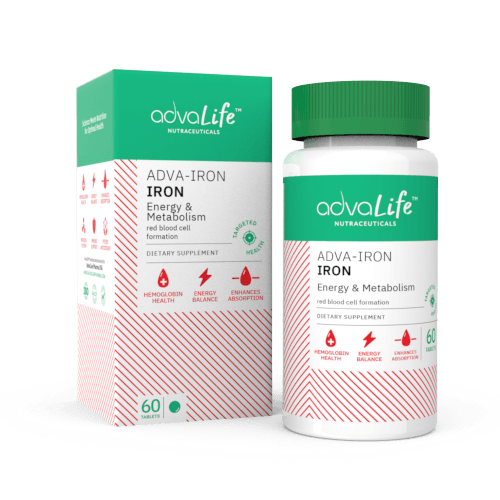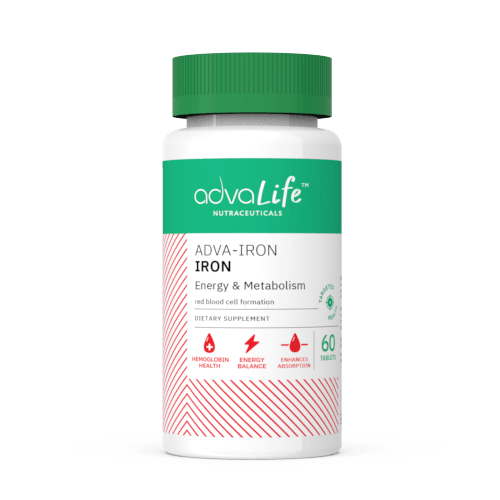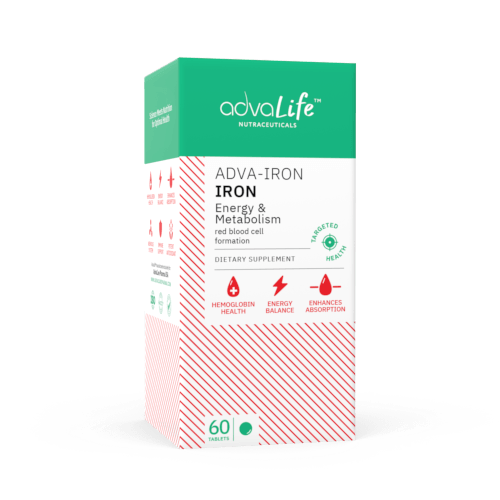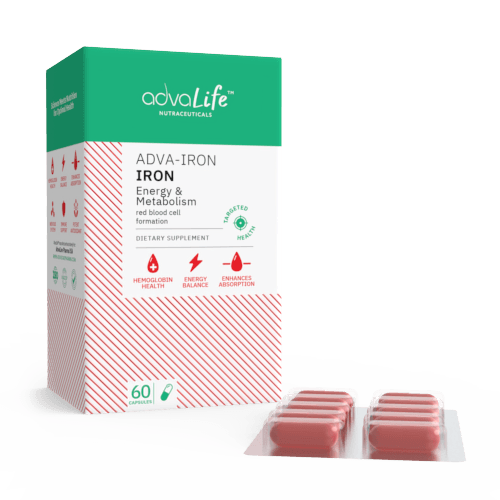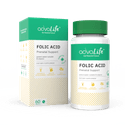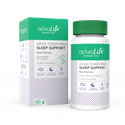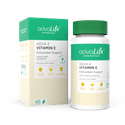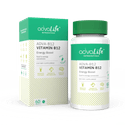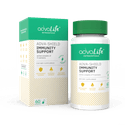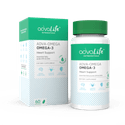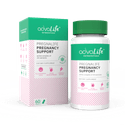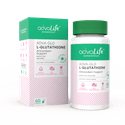- Home›
- Supplements›
- Tablet Supplements›
- Iron Tablets
Iron Tablets
What are Iron Tablets?
Iron Tablets are a high-grade supplement containing 25mg of elemental iron, a type of iron that is easily absorbed by the body and can help prevent and treat iron deficiency anemia. Elemental iron supplements have several advantages over other forms of iron, which are common in most iron supplement products. Elemental iron has a high absorption rate, reduced gastrointestinal side effects, and a lower risk of interactions with other nutrients or medications.
Iron is an essential mineral that is necessary for the formation of hemoglobin, the protein in red blood cells that carries oxygen throughout the body.
At AdvaCare Pharma, we are committed to providing customers with safe and high-quality Iron Tablets that meet strict health, safety, and environmental standards. To achieve this objective, we utilize ISO/HACCP-certified facilities in the USA, India and China that regularly undergo vetting procedures to ensure compliance.
Why are we a quality Iron Tablets manufacturer?
As an HACCP/ISO certified manufacturer of Iron Tablets, AdvaCare Pharma USA is committed to delivering superior dietary supplements. Our mission through the AdvaLife™ brand is to support our partners and distributors in growing their businesses by providing reliable brands.
As a trusted iron supplement manufacturer, our Iron Tablets are widely trusted by medical experts globally, providing distributors with the opportunity to establish themselves as industry leaders. We conduct extensive testing and maintain compliance with ISO 22000, 9001, and HACCP standards, guaranteeing that our products meet the highest quality standards. Additionally, our manufacturing processes prioritize sustainability, ensuring that we minimize our environmental impact.
Composition
AdvaLife™ Iron Tablets
Per Serving: Iron: 25mg (Serving Size: 1 tablet)
AdvaLife™ Iron Capsules
Per Serving: Iron: 25mg (Serving Size: 1 capsule)
Targeted Health Support
Benefits
Iron benefits the hemoglobin production
Iron is crucial for the production of hemoglobin, a protein found in red blood cells responsible for transporting oxygen throughout the body. Insufficient iron levels can result in anemia, characterized by fatigue and weakness. Iron can effectively prevent and address iron deficiency anemia by boosting hemoglobin levels and ensuring sufficient oxygen delivery to organs and tissues.
Iron benefits energy level enhancement
Iron plays a significant role in energy metabolism by assisting in the conversion of nutrients into energy. Inadequate iron levels can lead to reduced energy production, resulting in fatigue. By supplying the body with essential iron, the overall energy levels and physical performance can be improved.
Iron benefits immune health
Iron is essential for bolstering immune system function because it has a crucial role in the growth and maturation of immune cells. Insufficient iron levels can compromise the immune response, rendering the body more vulnerable to infections and illness. Supplementation can aid in maintaining optimal iron levels, which supports the body's immune defenses and promotes overall health.
Iron benefits pregnant women
During pregnancy, the demand for iron rises due to fetal growth and placental development. Iron supplements are crucial to decrease the risk of iron deficiency, low birth weight, and preterm delivery. Maintaining adequate iron levels is also essential for maternal health, as it helps reduce the chances of post-delivery anemia for both the mother and the baby.
Ingredients
Iron is an important nutrient for overall health and well-being. It plays a vital role in the proper functioning of the body by aiding in the production of enzymes and hormones, supporting cognitive development, and promoting healthy skin, hair, and nails.
Iron deficiency can lead to anemia, a condition in which there are not enough red blood cells to carry oxygen throughout the body, resulting in fatigue, weakness, and shortness of breath. Iron can be obtained through food sources such as meat, seafood, beans, and fortified cereals, but iron supplements may be recommended for those who are deficient or have trouble absorbing iron from food.
However, it is important not to exceed the recommended daily intake of iron, as excessive intake can be harmful and even toxic.
Uses
What are Iron Tablets used for?
- help prevent and treat iron deficiency anemia
- support the immune system
How are Iron Tablets used?
This supplement is to be swallowed with water, taken preferably with a meal.
What dose of Iron should be taken?
The recommended dosage of iron is 1 tablet daily, or as directed by a healthcare professional.
Do not exceed the recommended daily dose. A laxative effect may occur in case of overdose.
Are there any side effects of this supplement?
The most common side effects are constipation and diarrhea. Other side effects include nausea and vomiting, but only when taken in higher than the recommended doses.
Black stool is normal when taking iron supplements.
If you notice any of these side effects, contact a doctor. Most of the side effects occur when the supplement is taken in higher dosages.
When should I take this supplement?
This supplement should be taken on an empty stomach. However, it can lead to stomach cramps, nausea, and diarrhea in some people.
Can Iron be taken with other vitamins and minerals?
Iron can be taken with vitamin C to enhance absorption in the body. Try to take it at least 2 hours before taking calcium, zinc, and magnesium supplements because they can interfere with iron absorption. It is recommended to space out the consumption of these minerals and consult a healthcare provider for personalized advice.
How long should Iron be taken?
The duration of the supplementation is based on individual needs, such as dietary iron intake, the presence of iron deficiency, or specific health conditions.
A professional should give you advice after assessing the iron levels through blood tests. For correcting iron deficiency, treatment might last from 3 to 6 months, but for ongoing support or prevention, the duration could be longer.
Are there any tips for taking this product?
This supplement should never be combined and taken at the same time with milk, calcium, and antacids. Wait at least 2 hours after taking these foods and then take the supplement.
Also, try to avoid high-fiber foods like whole grains, raw vegetables, and bran. Foods and drinks with caffeine can also interact with iron.
It is recommended to take this supplement with vitamin C supplement or orange juice. This can enhance iron absorption in the body. Try to stay hydrated during the whole day when taking iron products.
Who can benefit the most from this supplement?
Pregnant and menstruating women can benefit from iron tablets. It is also recommended for frequent blood donors and people with kidney diseases, including people on dialysis. Premature babies and infants can benefit from this supplement. However, children are mostly recommended to take iron in the form of gummies or drops. This also depends on the child's age and the current health condition.
Can Iron supplements interact with other drugs?
Iron supplements have the potential to interact with various medications, particularly antibiotics, and drugs used to treat thyroid disorders and osteoporosis. These interactions can affect the absorption or effectiveness of both the iron supplement and the medication, leading to potential health complications. Iron can interact with quinolone and tetracycline antibiotics. It can reduce the absorption and efficacy of these antibiotics if they are taken too closely together.
It is crucial for individuals taking iron supplements to discuss all current medications with their healthcare provider to identify and avoid any potential interactions.
How should Iron Tablets be stored?
This supplement should be stored in a cool, dry place, away from direct sunlight and out of reach of children. Ensure that the packaging is not contaminated and that the quality of the supplement is maintained.
Target Consumer Segments
- Women of Reproductive Age (18–45): females at risk of iron deficiency due to menstruation, pregnancy, or postpartum recovery, requiring targeted anemia support
- Pregnant & Lactating Women (25–40): expecting and nursing mothers needing iron supplementation for fetal development and maternal health
- Children & Adolescents (6–18): growing individuals with increased iron demands for cognitive development, energy, and immune function
- Adults With Iron-Deficiency Anemia (30–60): men and women managing chronic fatigue and low hemoglobin levels, seeking therapeutic supplementation
- Vegetarians & Vegans (20–50): individuals following plant-based diets who may have insufficient iron intake and require non-heme iron support
- Post-Surgical & Chronically Ill Patients (30–65): those undergoing recovery or managing long-term illnesses needing restorative nutritional therapy
Regional Consumer Demand
North America
Market Insight: Strong demand from women’s health and anemia-prevention categories supports consistent sales. Recommended Dosage: Standard Formula in 120 units/box — addresses higher nutritional needs in at-risk populations and active lifestyles.
Europe
Market Insight: Regulatory emphasis on clinically supported supplementation drives trust in iron products. Recommended Dosage: Standard Formula in 120 units/box — aligns with physician-guided recommendations for anemia and prenatal health.
Middle East
Market Insight: High prevalence of iron deficiency among women fuels market growth opportunities. Recommended Dosage: Standard Formula in 60 units/box — provides effective therapeutic support for widespread nutritional deficiencies.
Latin America
Market Insight: Growing health awareness and affordability concerns boost demand for essential nutrients. Recommended Dosage: Standard Formula in 60 units/box — cost-effective daily dose suitable for preventive supplementation.
Southeast Asia
Market Insight: Nutritional gaps due to dietary habits sustain steady demand for iron supplements. Recommended Dosage: Standard Formula in 60 units/box — practical daily intake for preventive health across diverse populations.
East Asia
Market Insight: Aging populations and women’s health markets sustain demand for clinically proven products. Recommended Dosage: Standard Formula in 120 units/box — effective dosage for therapeutic use in high-need consumer groups.
South Asia
Market Insight: Iron-deficiency anemia remains a widespread public health challenge, driving supplementation uptake. Recommended Dosage: Standard Formula in 60 units/box — affordable preventive dose accessible to large populations.
Africa
Market Insight: High incidence of anemia and maternal health concerns make iron supplements a critical category. Recommended Dosage: Standard Formula in 60 units/box — provides accessible and scalable support for public health needs.
Precautions
Adverse reactions may occur as a result of taking Iron Tablets.
Do NOT use these Iron Tablets if you:
- are hypersensitive to ferrous sulfate.
- have a pre-existing medical condition, like a liver or kidney disease.
These supplements may not be appropriate for those with certain diseases. Users who are diagnosed with any medical condition or taking any medications must consult with a medical professional first.
FAQs
What is the manufacturing process for your supplements?
Our manufacturing process at AdvaLife™ starts with the meticulous selection of premium raw materials sourced from reputable suppliers. These materials undergo rigorous testing to verify their purity and potency, ensuring that only the highest quality ingredients are used in our supplements.
Which certifications validate the quality and safety of your supplement products?
AdvaLife™ supplements possess ISO, HACCP, BRC, NSF and/or Halal certifications. We have several production lines to meet the specific certification and registration requirements of each country.
Do you offer documentation for your supplement products' quality control processes?
Our quality control processes for supplement products entail comprehensive testing at every stage of production. From sourcing raw materials to final product analysis, we maintain meticulous records of ingredient testing, in-process checks, and manufacturing protocols. Our documentation ensures transparency and adherence to stringent regulatory standards.
Do you provide assistance with product labeling and regulatory compliance?
Our Regulatory Affairs Department works closely with our design team to ensure that our standardized packaging meets the stringent requirements of USFDA and global regulatory authorities. In cases where additional customization is necessary to adhere to specific country regulations, we provide tailored support to ensure compliance with local labeling requirements.
Do you offer assistance with marketing and promotional materials?
We provide significant marketing support for our distributors to increase brand awareness and accelerate market expansion. Customized promotional materials, including but not limited to visual merchandising, printed materials and digital activations, are provided free-of-charge. We work closely with our distributors to ensure they have the tools to succeed in their markets.
Can I get help with regulatory support for supplement product registration?
With a seasoned Regulatory Affairs Department, we offer robust support for supplement product registration. Drawing from our vast experience in registering thousands of medical products worldwide, spanning over 65 countries, we ensure efficient and effective assistance in navigating the registration requirements.
Do you have documentation verifying the efficacy of your supplement formulations?
AdvaLife™ offers comprehensive documentation validating the efficacy of our supplement products. This includes a range of clinical studies, research papers, and/or customer testimonials, all showcasing the effectiveness of our formulations. Moreover, our collaboration with healthcare professionals ensures that our products remain at the forefront of scientific advancement in the supplement industry.
References
What is the evidence for Iron’s impact on pregnant women?
Anemia is a common condition during pregnancy. Many studies show that iron supplements during pregnancy can benefit both the mother and the infant.
Prenatal Iron Supplementation Reduces Maternal Anemia, Iron Deficiency, and Iron Deficiency Anemia in a Randomized Clinical Trial in Rural China, but Iron Deficiency Remains Widespread in Mothers and Neonates
This study focuses on iron supplementation in mothers and neonates. It was conducted from June 2009 to December 2011 in China. It included women with uncomplicated pregnancies at ≤20 weeks gestation, aged more than 18 years, and with hemoglobin ≥ 100g/L. They were randomly assigned 1:1 to receive daily iron (300mg ferrous sulfate) or placebo + 0.40mg folate from enrollment to birth. Iron status was measured from maternal venous blood and cord blood.
A total of 2371 women were randomly assigned, with outcomes observed for 1632 women or neonates (809 receiving placebo/folate and 823 receiving iron/folate, comprising 1579 mother-newborn pairs, 37 mothers, and 16 neonates). The majority of infants (97%) were born at term. Maternal hemoglobin levels at or near term were significantly higher in the iron group compared to the placebo group. The risk of anemia was reduced, as well as the risks of iron deficiency and iron deficiency anemia.
The conclusion of the study is that prenatal iron supplementation reduces anemia, ID, and IDA in pregnant women.
Effect of iron supplementation on fatigue in nonanemic menstruating women with low ferritin: a randomized controlled trial
This study focused on the benefits of iron supplements in nonanemic menstruating women with fatigue. It was studied the effect of iron therapy on fatigue and quality of life. Also, the hemoglobin, ferritin, and soluble transferrin receptor levels in nonanemic iron-deficient women with unexplained fatigue were examined.
This is a multicentre, parallel, randomized controlled, closed-label, observer-blinded trial. The study included 44 primary care physicians from France. This supplement was randomly assigned to 198 women from 18 to 53 years who had fatigue and lower ferritin levels. The ferritin levels were less than 50 ug/L, and hemoglobin was greater than 12.0g/dL. Participants received oral ferrous sulfate (102 participants), and the other group consumed a placebo (96 participants) for 12 weeks. The biological markers were measured at 6 and 12 weeks.
The results show that fatigue decreased by 47.7% in the iron group and by 28.8% in the placebo group. However, there were no significant effects on quality of life, depression, or anxiety. Compared with placebo participants, those who took iron supplementation had increased hemoglobin (0.32g/dL; p = 0.002) and ferritin (11.4μg/L; p < 0.001) and decreased soluble transferrin receptor (−0.54mg/L; p < 0.001) at 12 weeks.
The conclusion of the study is that iron supplementation should be considered for women with unexplained fatigue who have ferritin levels below 50μg/L.

You might be interested in...
Why AdvaCare Pharma?
As an industry leader, we are aware of our responsibility to provide affordable and sustainable solutions to improve healthcare worldwide.
